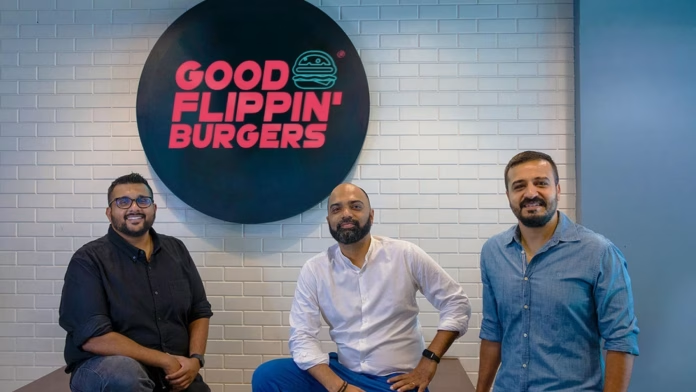Burger chain Good Flippin’ Burgers has recently announced that it raised $4 million in a fresh round of funding through Tanglin Venture Partners. This significant investment comes just a year after the company had successfully secured $1 million in previous funding.
The company has announced that funds will be injected to facilitate expansion in both the dining and quick service businesses, as well as the supply chain network. According to the company, Ashika Capital served as the financial advisor for this funding.
Viren DSilva, Co-Founder of Good Flippin’ Burgers said, “This investment is a significant milestone and will empower us to expand our operations, fortify our supply chain, and bring our burgers to a wider customer base.”
Established in 2019 by Viren Dsilva, Sijo Mathew, and Sid Marchant, the brand currently operates across 23 outlets.
Sankalp Gupta, Partner at Tanglin Venture Partners said, “Viren, Sid, and Sijo are exceptional founders who possess a deep customer obsession and a focus on efficient processes. They have built a strong brand in Good Flippin’ Burgers, earning tremendous customer loyalty. We are particularly impressed by their emphasis on supply chain capabilities, which has allowed them to maintain the highest level of quality and consistency across their stores. At Tanglin, we are extremely excited to collaborate with the team and work towards building a lasting business.”
According to a recent note from ICRA, a prominent ratings company, India’s leading quick-service restaurant (QSR) companies have outlined ambitious growth plans. They are aiming to open approximately 2,300 new stores between the fiscal years 2023 and 2025. These expansion initiatives are projected to necessitate a capital expenditure of around INR 5,800 crore.
As per the note, the QSR chains intend to capitalize on the demand in both metropolitan cities and smaller markets. This surge in demand can be attributed to competitive pricing as well as an increased preference for Western-style fast food.
Despite experiencing a slowdown in the March quarter, which was attributed to inflationary pressures, the QSR chains remain determined to pursue their expansion plans.
ICRA’s forecast indicates that the majority of this expansion is expected to be financed through internal accruals and cash reserves, with additional funds raised through pre-IPO and IPO channels.





